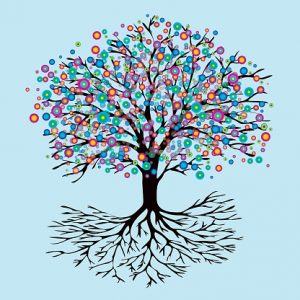






A tree of life with abstract rainbow flowers
My colleague, Dr. Mohammed Baobaid at the Muslim Resource Centre for Social Support and Integration, suggests that we think about the differences between collectivist and individualist perspectives in cultures. These differences have an impact on how we intervene in situations of family violence. Some cultures place more emphasis on collectivist values – individual identities are subsumed as part of the collective. What is good for the whole – the community – is prioritized and individuals are more likely to think about how their actions impact the community before they think about their own personal goals. However, collectivist perspectives can prevent victims of family violence from disclosing their experiences for fear of the repercussions for the group. For example, women from racialized Muslim minority groups are hesitant to speak out about family violence because of negative public perceptions of Muslims fueled by Islamophobia. This makes it more difficult to ensure the safety of individuals from violence within collectivist cultures.
Canadian culture, on the other hand, tends to prioritize the needs and desires of the individual over that of the community. Individualist perspectives have been influenced by liberalism, an ideology that promotes individual rights and civil liberties within democratic societies. Collectivist and individualist perspectives are not polar opposites but exist on a continuum because, as we all are aware, within Canadian culture there are people who promote and work for the common good. Likewise, in primarily collectivist cultures, individuals pursue their goals despite pressure to conform to community norms. Public interventions in situations of family violence in Canada are primarily individualist. In order to manage risk, individuals are separated from relationships – women are advised to seek safety in a transition house, children are removed from families, and men are arrested, charged and incarcerated. These interventions are designed to provide safety in the short-term but do not address the long-term needs of survivors or perpetrators.
I suggest that many Christians in Canada embrace a collectivist faith perspective while living in individualist culture. At least from my perspective as a Catholic, my faith tradition and involvement in social justice activities has taught me to prioritize the common good. Christians believe that our church community is the Body of Christ alive in the world. We are all interconnected. My faith has enabled me to learn about and develop compassion for the people in my community and beyond who suffer injustice. Through no fault of their own, people are born into situations of inequality based on the ethnicity, gender, class and ability of their parents. These social inequalities are the result of human social structures. Based on compassion and love for my neighbours, I try to work together with others for social justice.
As a sociologist of religion, I have learned that family violence thrives in circumstances of inequality in which the power of some groups of people depends on the lack of power for other groups. It appears that family violence takes place between individuals, which of course is true. Violence between individuals occurs when one person tries to exert power and control over another through physical, sexual, emotional, financial, or spiritual abuse. However, the conditions that allow family violence to be such a widespread social problem are the result of cultural or social forces. All cultures have created and maintained social inequalities. This sends the message to citizens that inequality is “normal” and that coercive control is an acceptable means of maintaining power. For example, structures based on ethnicity/race are evident in the historical socio-economic inequalities between Canada’s Indigenous and racialized immigrant groups compared to the white majority.
Thus, our work to provide effective interventions in situations of family violence should consider the problem at multiple levels – certainly at the level of relationships but also at the community level. Working for the common good when it comes to family violence, means that religious groups must also advocate for access to affordable housing and transportation, childcare, and legal services, as well as improved access to mental health care and secure employment. Religious leaders can help congregations connect the dots. Solving the problem of family violence includes addressing the conditions of social inequality experienced by families and working for the common good.
Catherine Holtmann, 10 January 2022